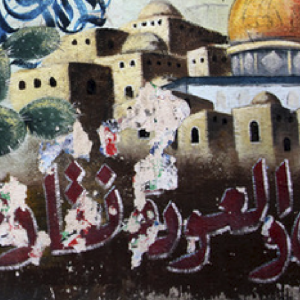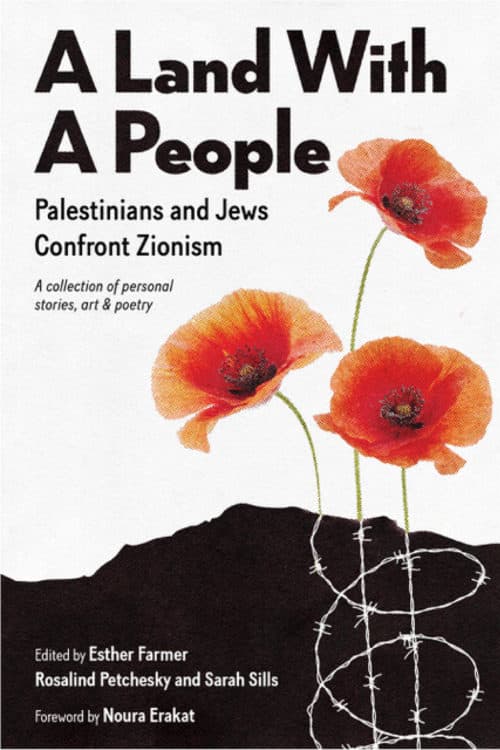A Land With A People:
Palestinians and Jews Confront Zionism
Edited by Esther Farmer, Rosalind Petchesky and Sarah Sills
226 pages, 19$, 978-1-58367-929-6
Reviewed by Eleanor J. Bader
With few exceptions, Jewish children reared in religiously observant households are taught to revere Israel as a place of respite and safety, a country whose intrepid founders made “a desert bloom.” What’s more, they’re taught that the area was a perfect set up, “a land without people for a people without land.”
This, of course, is a complete fabrication. As Palestinian-American attorney Noura Erakat writes in the Foreword to A Land With a People, “Zionism is not the triumphant story of Jewish emancipation from centuries of antisemitism, but is a colonial project facilitated by European imperial powers driven by a desire to remove Jews from Europe rather than combat their own white supremacy.” Indeed, she explains, the Zionism of Israel’s framers did not challenge Europe’s lingering hatred of Jews, but instead relied on God’s alleged biblical promise to them, a pledge that made Israel their “birthright.” The reality — that fulfillment of this compact with the Almighty resulted in the dispossession of approximately 750,000 Palestinians — was ignored.
A rich tapestry of voices: queer writers of Jewish and Palestinian descent and Jews from non-European backgrounds are prominent. Several essays by people raised in fervently-pro-Israel households provide texture and nuance.
A Land With A People tells the story of Palestinian removal, but it also does more than this. In 35 personal and scholarly essays, poems and photographs, non-Zionist Jews affiliated with Jewish Voice for Peace (JVP) join Palestinian activists to share their grief, anger, and dreams of secular coexistance. Atrocities committed by Israel are presented in stark detail and the U.S. role in propping up the regime is outlined and denounced.
JVP activist Rosalind Petchesky’s ‘Zionism’s Twilight’ opens the volume with a brief history of Israel and the political machinations that led to its creation. She begins by introducing the 1917 Balfour Declaration, Britain’s public statement of support for the establishment of “a national home for the Jewish people.” Petchesky writes that opposition to the declaration was immediate and notes that when the first Palestinian Congress met in Jerusalem in 1919, participants demanded independence for Palestine and rejected the legitimacy of British rule. Decades of struggle followed. Nonetheless, in 1947 the United Nations General Assembly agreed to partition Palestinian land and in May of 1948 the state of Israel came into being.
Under the provisions of the U.N. agreement, Jews living in every nook and cranny of the world were automatically granted Israeli citizenship. Not so Palestinians. As Petchesky reports, a 1952 Nationality Law gave Israeli citizenship only to those Palestinians who had remained in Israel between 1948 and 1952, thus barring those who had fled or been expelled from the country from legal residency.
Flash forward 70 years and the legal restrictions have become far more egregious. Worse, Palestinian territories that were initially under the jurisdiction of Egypt and Jordan, including the West Bank, Gaza, and East Jerusalem, are now under Israeli control. And despite continued resistance to their endemic oppression, Israel continues to rule Palestinian enclaves with an iron fist, suppressing dissent and resisting international calls to respect Palestinian human rights.
A Land With A People decries the inhumanity at the heart of Israeli social policy, but the book’s strength — and what sets it apart from other books that tread similar ground — is the rich tapestry of voices that are included. Queer writers of Jewish and Palestinian descent and Jews from non-European backgrounds are prominent. In addition, several essays by people raised in fervently pro-Israel households give the book texture and nuance.
Palestinian territories that were initially under the jurisdiction of Egypt and Jordan, including the West Bank, Gaza, and East Jerusalem, are now under Israeli control.
Contributor Talia Baurer, for example, writes in ‘Unlearning Zionism’ that, “I grew up knowing that Israel was my homeland, that I had deep biblical and historical roots there, and that its existence made me safer in the world.” Baurer’s beliefs, she explains, began to shift when she entered college and encountered Students for Justice in Palestine. “After my freshman year, I spent a month in Israel,” she writes, “and visited the West Bank for the first time. My group toured the Palestinian town of Susya with Breaking the Silence, an Israeli human rights organization.” Seeing segregated streets and hearing first-hand accounts of discrimination unsettled Baurer. “I finally let go of the historical narrative of my childhood education,” she writes, “and began to hollow out my own sense of what Israel and Zionism meant for me, my community, and the world in general.”
Hers is a thoughtful and heartfelt explication and one that addresses the prominent conflation between antisemitism and anti-Zionism.
Other contributors to the anthology also tackle this terrain. In ‘An Israeli in New York Testifies about Zionism and BDS,’ U.S. law student Sagiv Galai, who was raised in the West Bank, writes that supporting the Boycott, Divest, and Sanction (BDS) movement “is not antisemitic, regardless of how much the right-wing and powerful Zionist groups may want us to believe the opposite.”
You can find the above review at the Indypendent


Comments are closed.